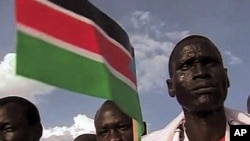In Africa, a new state could be created in 2011. The tentative date for a referendum in Sudan on whether Southern Sudan will secede and form a new nation is January next year. The referendum is part of the Comprehensive Peace Agreement, or CPA, between the government of Sudan and the Sudan People's Liberation Movement, or SPLM, in the south.
Members of Illinois' Sudanese Community gather at Truman College in Chicago to talk about events in their homeland.
After Sudan's national elections, and with a referendum scheduled on the future of Southern Sudan, there is much to discuss.
Although many believe the April re-election of President Omar al-Bashir was tainted by fraud, Benjamin Akol believes the vote was important. "This election, in general, is good, because it was the first time Sudanese experience democracy," he says, "and it is an historic moment in their struggle."
Akol fled Southern Sudan in 1987. Now he serves as Vice Chairman of the Illinois Chapter of the Sudan People's Liberation Movement, or SPLM. Under the 2005 peace agreement between Sudan's government in Khartoum and the southerners, Southern Sudan became semi autonomous and a referendum was set for 2011.
The Chicago meeting focused on the possible creation of a new nation state.
"It's a critical juncture for the entire continent," said Will Reno, an Associate Professor of Political Science at Northwestern University near Chicago.
He says developments in Sudan will have implications beyond Sudan's borders. If the referendum takes place, Southern Sudanese are expected to vote for secession. "A new country could be created that isn't made out of the old colonial borders, so that is a big departure from decolonization in Africa," Reno said.
Benjamin Akol says independence would come with serious challenges. "Southern Sudan will be a landlocked country, and it will have no outlet or boundaries with lakes and oceans," he said. "That will be a problem for all Sudanese. Southern Sudan has the oil too that they have to extract. And by doing that they have to have a port whereby they can sell."
Recently, talks between Sudan's government and the SPLM broke down over who would be eligible to vote in the referendum.
Sudanese activist Peter Bul says many of his fellow countrymen worry the referendum might not take place. So do analysts, who predict the north might block the vote and a new north-south war could break out. "It's up to us to really forge on to pressure this government, that this has to happen," he says, "otherwise if we remain silent on this then we know this is not going to happen, and if it doesn't happen, then we will have another war in the country."
The war between the north and the south that ended in 2005, left two million dead.
If the January referendum does take place, it will have little impact on the conflict in Darfur, in western Sudan, which has been in a lull.
Several hundred thousand people have died in the violence there and the United States called it genocide. Sudan's President, Omar al-Bashir has been charged by the International Criminal Tribunal with crimes against humanity in Darfur.




